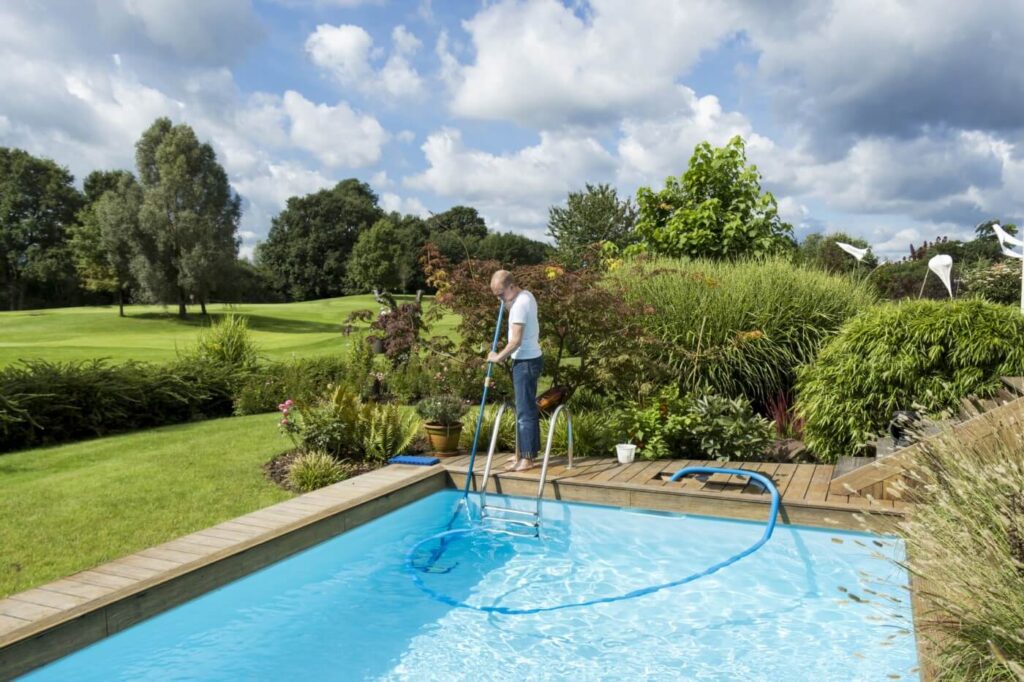
Did you step out onto your deck this morning and notice that your pool’s water level was low? Or while napping in your lounge chair, did you hear gurgling from the skimmer? You’re not alone. It happens to many pool owners. But the question is: Is your pool losing water every day from normal evaporation? Or is it a pool leak? Evaporation can vary based on sun, wind, humidity, surface area, and the difference between water temperature and air temperature. A pool in a windy, dry climate like El Paso will typically evaporate faster than a pool in Dallas. And if your pool is heated during the winter, you’ll lose more water because of evaporation.
How Much Water Loss In a Pool Is Normal?
Water loss can vary wildly depending on whether you are in a wet, rainy period or a drought. Your pool likely contains 18,000 to 20,000 gallons of water. During a drought, many inground pools can lose 60-120 gallons of water per day just due to evaporation. Losing water can make for a costly municipal water bill or overwork your water well’s pump. So, it’s understandable you want to make sure none of this precious resource has leaked out of your pool. You can conserve water by turning off pool water features that might lead to additional evaporation. If you’ve recently changed the landscaping around your pool, you could notice a difference in evaporation. Fences and shrubs can protect your pool from windy conditions that lead to faster evaporation. Adding a screen or shade to reduce the sun’s rays can also help you save water. Here are some common water loss scenarios and what might be the cause:
1. Pool Loses Water All Day
Pool leaks can be difficult to diagnose as weather patterns change. Afternoon thunderstorms may alter your pool’s water level. Pool chemicals like chlorine often evaporate rapidly. You can add stabilizers to your pool water to keep the chemicals in your pool and out of the air. A good rule of thumb is that if your pool loses more than ¼” in a humid environment and ½” in a dry environment, you might have a pool leak. You should perform the test at the end of this post to see if your pool is leaking.
2. Pool Loses Water Overnight
The amount of water that evaporates from your pool overnight can vary throughout the swimming season. Although days might be warm enough for swimming, cool nights will lower your pool temperature. If you use a heater, your pool warms up and evaporates more water. As the summer air stays warm overnight, your pool will evaporate even faster. Keeping your pool covered can help keep water and heat from escaping into the air.
3. Pool Is Losing Water When the Pump Is Off
If you’ve turned off your pump system for a day and the pool level is dropping more than 1/4–1/2” per day, you might have a pool leak. The leak is likely somewhere in the structure of the pool or on the suction side of the pool pumping system. Check around drains, your skimmer, piping, and fittings on the intake side of your pool pump.
4. Pool Is Losing Water When the Pump Is On
If your pool water level only goes down when the pump is on, your pool structure is probably not to blame. Check the piping and components on the pressure side of your pool pump. Leaks can be subtle. Look for puddles or ground that appears wetter than its surroundings.
5. Pool Loses Water in the Winter
Keeping your pool heated during the winter or cooler parts of the swimming season will contribute to evaporation. It’s wise to cover your pool when it’s not in use. Adjust the thermostat down when you don’t plan to swim to decrease the amount of water that evaporates from your pool in the winter.
6. Pool Is Losing 1 Inch of Water Per Day
Losing more than ½” of pool water per day indicates you likely have a leak in your pool’s structure or your pool pump system. You should call your pool service for a thorough leak inspection. You might not be able to keep up with refilling your pool at this point. Your pump system can be damaged if the water system begins to take in air from the skimmer. And your pool can even come out of the ground if water leaks from the pool and saturates the surrounding earth.
7. Pool Is Losing Water After Frequent Use
You might also just be losing water because you’ve been using your pool more. Lots of splashing around can force water onto your deck and into the air. If you only notice a drop in water level after a week of heavy pool use, there might not be a problem at all. If your filtration system requires backwashing maintenance, you’re going to lose water during the process. Have you or your pool service company switched to a more frequent backwashing schedule? Is it time to replace your filter?
Common Areas Where Your Pool Might Be Leaking
Although any part of your pool that holds water might be responsible for a leak, there are some common areas to check.
Skimmer. The pool skimmer is one of the usual suspects for pool leaks. The skimmer materials can become damaged. Where the skimmer attaches to the pool can begin to leak. And the piping exiting the skimmer can develop a leak as well. Check all these areas first.
Return Piping. Your pool’s return piping is another area where pool leaks can start. This piping can be hard to access if it is underground. Check the ground for soft, wet areas that may be a result of ongoing leaks.
Main Drain. No pool owner wants to hear that their main drain is leaking. Located at the bottom of the deepest part of your pool, a main drain leak is difficult to repair and can be hard to locate. You may want to contact your pool builder about getting access and determining if your main drain is leaking.
Pool Lights and Jets. Any openings in the structure of your pool can eventually begin to leak. The area around your pool lights and jets may lose their watertight seal. Your pool service company can help you ascertain any problems and reseal your fixtures.
Pool Structure. Finding a leak in your pool’s structure can be very easy. Or very difficult. Some leaks can be easily spotted with a visual inspection of the surface or tiling. Other leaks may require a dye test. Your pool supply store can offer some products and advice. If your pool is aging, it may be wise to call in a pool renovation company to repair or resurface your pool.
What to Do If You Think You Have a Pool Leak
If you think your pool is losing water due to a pool leak and not just evaporation, here’s how to find out!
- Turn off your auto-fill system if you have one
- Turn off your pool pump
- Fill your pool to the proper level
- Mark the pool water level on the skimmer
- Fill a bucket near the top
- Mark the bucket water level
- Place the bucket on your first pool step
- Check the water levels after 24 hours
- Take notes
- Refill and repeat the test with the pump running continuously
If your bucket and pool go down the same amount, you’re most likely only losing water due to evaporation. If the water level went down in the pool more than the bucket, you likely have a pool leak. If the water level went down with the system off, you might have a structural leak or a leak in your suction side plumbing. If your pool only loses water when it’s running, you probably have a leak in your pool pump system’s pressure side plumbing.
Contact Gold Medal Pools If Your Pool Loses Water
If your bucket test results indicate a leak or are inconclusive, it’s a good idea to call in the experts. Our certified technicians at Gold Medal Pools can help you find out if your pool is losing water due to normal evaporation or a leak. Don’t hope that excessive water loss is due to splashing, evaporation, or some other factor. You’ll lose money and waste fresh water in the long run. Let our trained pool techs find and repair even the smallest pool leaks. Contact Gold Medal Pools today to book your leak inspection.





